

Coronavirus long-term effects: Some Covid-19 survivors face lung scarring, heart damage, and anxiety. At first, Lauren Nichols tried to explain away her symptoms.
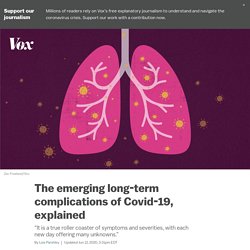
In early March, the healthy 32-year-old felt an intense burning sensation, like acid reflux, when she breathed. Embarrassed, she didn’t initially seek medical care. When her shortness of breath kept getting worse, her doctor tested her for Covid-19. Her results came back positive. But for Nichols, that was just the beginning. Coronavirus: An Original Comic. About COVID-19 symptoms and spread. On this page: What is COVID-19?
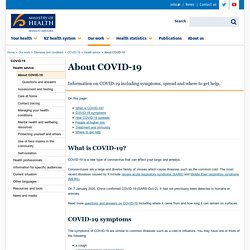
COVID-19 is a new type of coronavirus that can affect your lungs and airways. Coronaviruses are a large and diverse family of viruses which cause illnesses such as the common cold. The most recent diseases caused by it include severe acute respiratory syndrome (SARS) and Middle East respiratory syndrome (MERS). Siouxsie Wiles & Toby Morris: What we don’t know about Covid-19. We’re beginning to solve a crucial part of the puzzle: just when, and for how long, are people infectious?
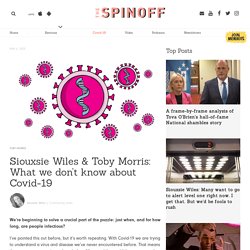
I’ve pointed this out before, but it’s worth repeating. With Covid-19 we are trying to understand a virus and disease we’ve never encountered before. That means there are many gaps in our knowledge. All around the world, however, people from different fields of study are trying to fill in as many of those gaps as they can. How an army of students is helping to feed vulnerable New Zealanders. Delivery services for supermarkets across the country are filling up weeks in advance, leaving immunocompromised people without options.
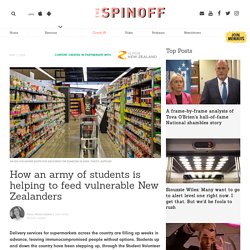
Students up and down the country have been stepping up, through the Student Volunteer Army, to help those in need. If anyone had said at this point last year that a smile from a stranger passing on the street could mean so much, nobody would have believed it. The current conditions we’re all living under have emphasised the importance of community, with a wave through a window taking on a much larger meaning than before. But for some of the most vulnerable people in our communities, the opportunity for interaction, however small, has been significantly reduced as they try to keep themselves safe from Covid-19. The switch from alert level four to alert level three has changed the daily lives of a lot of New Zealanders, from those who work in teaching to hospitality and retail. Amal Abdullahi with the handmade SVA heart she was given (Photo: Supplied) Explainer: How the coronavirus tricks its way into human cells. What is a virus? How do they spread? How do they make us sick?
Viruses are the most common biological entities on Earth.
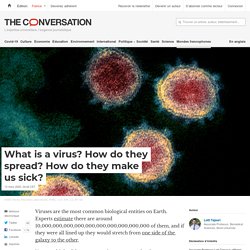
Experts estimate there are around 10,000,000,000,000,000,000,000,000,000,000 of them, and if they were all lined up they would stretch from one side of the galaxy to the other. You can think of them as nature’s own nanotechnology: molecular machines with sizes on the nanometre scale, equipped to invade the cells of other organisms and hijack them to reproduce themselves.
While the great majority are harmless to humans, some can make you sick and some can even be deadly. Are viruses alive? Viruses rely on the cells of other organisms to survive and reproduce, because they can’t capture or store energy themselves. Outside a cell, a virus it wraps itself up into an independent particle called a virion. When a virion attaches to a suitable host cell – this depends on the protein molecules on the surfaces of the virion and the cell – it is able to penetrate the cell. Does this “life cycle” make viruses alive? What are viruses made of? (39) The Coronavirus Explained & What You Should Do. COVID-19: Questions and answers. Alert Level 1 On Monday 8 June at 11.59 pm New Zealand moved to Alert Level 1.
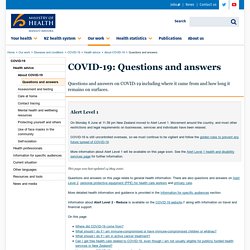
Movement around the country, and most other restrictions and legal requirements on businesses, services and individuals have been relaxed. COVID-19 is still uncontrolled overseas, so we must continue to be vigilant and follow the golden rules to prevent any future spread of COVID-19. More information about Alert Level 1 will be available on this page soon. See the Alert Level 1 health and disability services page for further information. This page was last updated 14 May 2020.
Questions and answers on this page relate to general health information. More detailed health information and guidance is provided in the Information for specific audiences section. Information about Alert Level 2 - Reduce is available on the COVID 19 website along with information on travel and financial support.